How To Create A Template The Uses Excel To Drop In Words Or Phrases To Email
Every week brings new projects, emails, documents, and task lists. Starting each of those from scratch—no matter how small the project—can be a real drain on your fourth dimension. And, actually, how much of that is completely different from the work yous've done before?
Odds are, not much. Many of our day-to-solar day tasks are variations on something we've done hundreds of times earlier. Like a contract for a freelance projection, for example, or a project update email for your clients.
Create and autopopulate a Google Docs template
Don't reinvent the wheel every time you beginning something new. Instead, use templates—standardized files with text and formatting as the starting bespeak for new work. Once you relieve a separate version of the template, merely add, remove, or change any info for that unique document, and you'll accept the new work completed in a fraction of the time.
Templates work everywhere: in give-and-take processors, spreadsheets, projection management apps, survey platforms, and electronic mail. Here'due south how to employ templates in your favorite apps—and how to automatically create documents from a template—so yous tin get your mutual tasks done faster.
Why templates?
Templates take time to build, and it'due south like shooting fish in a barrel to wonder if they're worth the investment. The short answer: absolutely. Editing a template is much faster than formatting something from scratch. It's the difference betwixt copying and pasting some text, or retyping it.
That'southward non all: using a template means you're less probable to leave out primal information, also. For instance, if you demand to send freelance writers a contributor understanding, modifying a standard contract template (instead of writing a new contract each time) ensures you won't get out out that crucial clause about owning the content once you've paid for it.
Templates besides guarantee consistency. Maybe you send regular project updates to clients or investors. With a template, you know the update will always have the same formatting, pattern, and full general structure.
How to create swell templates
Not all templates are created equal—and some things don't need a template. Here are a few guidelines to follow.
First, templates should be comprehensive. Information technology's easier to delete information than add together it in, so err on the side of adding as well much versus also footling.
Imagine you're creating a template of your resume. You'd desire to list in-depth details about your responsibilities and achievements, so you'll accept all the info you need to apply for any job. You can ever delete less-important notes later on, merely if it'due south not in the template y'all might forget information technology in the final version.
Templates should also make customization areas articulate. Give yourself visual clues, like "Hi [Name]," "Please hang tight until [DATE]," "Yous'll exist paid [X Amount] every 15 days," and and then on.
Some tools will automatically make full in these variables for you lot (more on that in a bit). But if you need to fill in the data on your ain, add some text that'south obvious and piece of cake to search for and then you can find text that needs to be changed without much attempt.

Finally, apply a standardized naming system for templates. I add [Template] to the end of the filename for each of my templates, such every bit "Blog Post [Template]" or "Project Calendar [Template]". To become started on a certificate just search for "[Template]" in whatever tool I'thousand using. Just choice a way to identify your document templates, and stick to it.
Build your ain templates
Permit'southward swoop in and comprehend how y'all tin can build templates for some common file types, similar text documents, presentations, projection checklists, and emails. The tools yous utilise for these activities likely vary—you might use Discussion to draft documents, while your colleague uses Google Docs.
We outlined how to brand templates in some of the most pop apps for each category. If we didn't cover your favorite tool, no worries: these strategies work on any platform. If you want to make a template in a unlike blazon of app—perhaps to make notes in a CRM or to log information in a database builder app—the general tips will still piece of work at that place, too.
How to create templates for:
-
Documents
-
Spreadsheets
-
Presentations
-
Project Management
-
Surveys
-
Email
How to create document templates
Creating standardized documents with the same typefaces, colors, logos and footers unremarkably requires lots of double-checking. But with templates, y'all merely have to do the grunt piece of work once.
Just set up your structure and style in advance—and type in the sentences yous include in virtually documents—and you'll save time whenever you create a new file in Google Docs or Microsoft Word. Then, with tools like Formstack Documents and HelloSign, y'all can build customized documents for clients and customers automatically.
Google Docs
When you create a new Google Docs certificate, do yous default to the "blank" option? If so, you're missing out on hundreds of templates for resumes, meeting notes, and reports.
These templates are attainable in two places. When you're in your Docs dashboard, clicking More will open a gallery with around 30 choices. You lot can as well bank check out Google's public template gallery, which has hundreds more choices. Merely click a template in either place to use it as the base of your new document.

Well-nigh of these templates are professionally designed—so when you don't have the time to create a nicely-formatted document, they're a skillful pick.
Simply style and structure alone don't add together up to a truly powerful template. You also want to mix in pre-written text so you tin finish the document by filling in a few blanks.
To brand your own template in Google Docs, start a new Blank document—or use one of the pre-fabricated templates as a blueprint. Then, make full it with your framework: your formatting, text styles, logos, default text, and anything else near of your documents demand.
For example, my posts tend to follow the same full general formula, so I've created a blog mail template. Information technology functions equally a general outline, and saves me from piddling with styles when I demand to focus on writing.
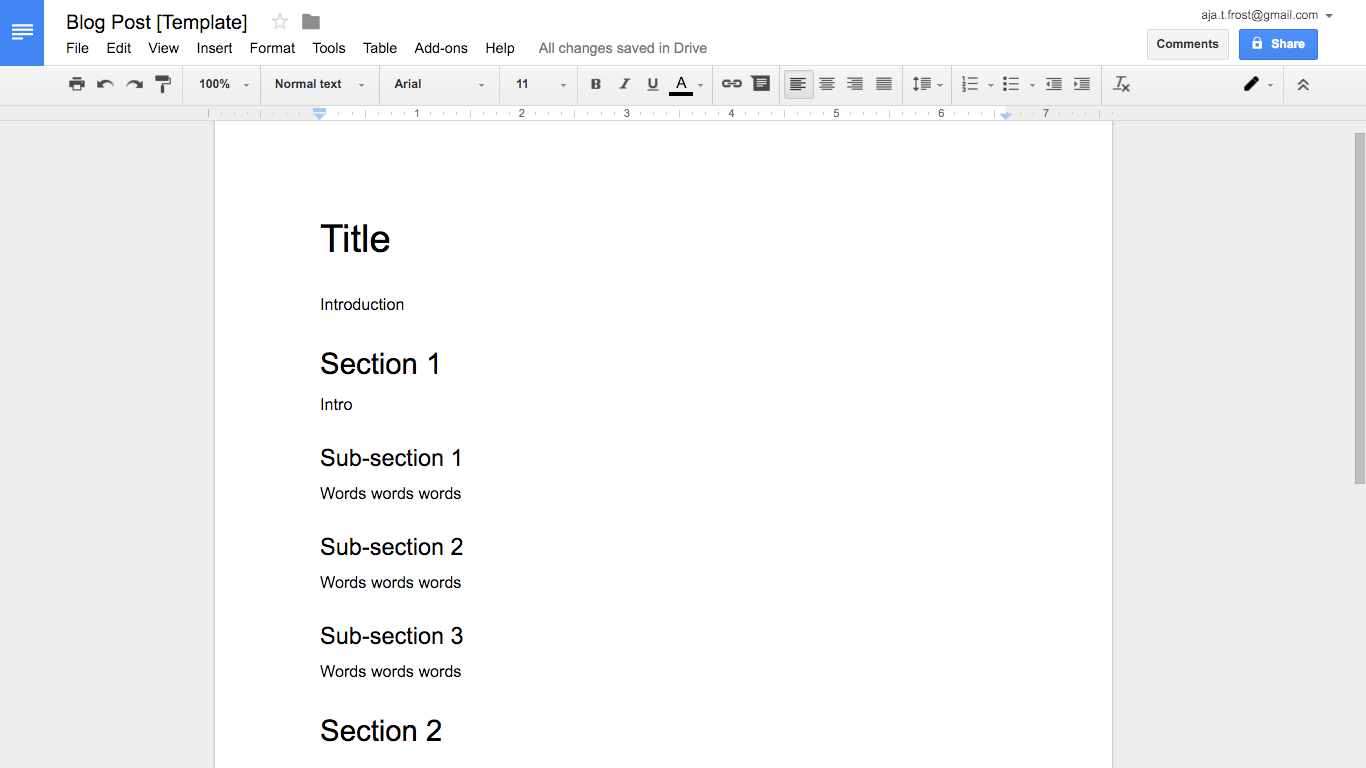
Now, relieve the template so you can reuse it again. Google Docs saves new documents automatically, but remember to give it a recognizable template name. Next time you need to make a document with this style, simply open up the template and click File > Make a copy in the menu. From at that place, just customize the copied document for your specific needs.
And if you demand templated spreadsheets, the same tips work in Google Sheets.
Microsoft Give-and-take
Like Google Docs, Microsoft Word is loaded with pre-fabricated templates, from coming together agendas and cover letters to business trip checklists.
However, Discussion besides lets you lot relieve your ain reusable templates as .dotx files (rather than the archetype .docx documents).
Say you've drawn up a business contract that you lot desire to save for time to come use. Just click File > Salve as Template. Next time you commencement a new document, your template will appear in your gallery of options, aslope Give-and-take's pre-existing templates. When you lot desire to brand a new version of the contract, create a new file, find the contract template, and click Open.
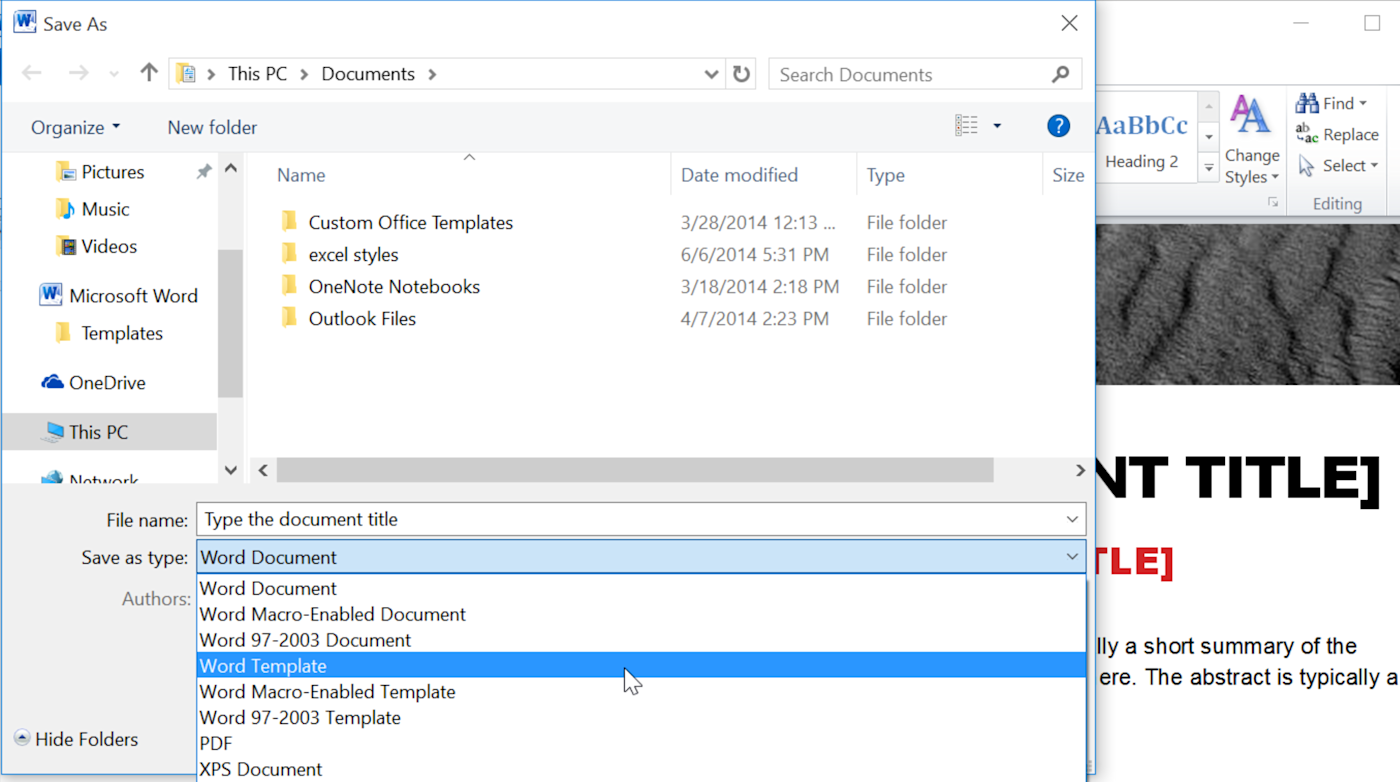
If y'all want to edit your template, select the Open dialog and alter the Files of Type option to Templates. And then, search for the template in question, open it, and brand your changes. From here on out, every document you create based on that template will contain those changes.
Having a distinction between templates and documents is really useful, since it protects you from accidentally modifying, deleting, or losing your main re-create.
Formstack Documents
If you regularly send out contracts, agreements, invoices, forms, or reports, chances are you've already created and saved templates for those. That doesn't mean you've circumvented all of the tedious work: Each time yous send a new version of the template, yous still accept to re-create-and-paste names, project info, dates, and other relevant details into your document.
Enter Formstack Documents. This tool will combine your template with unique data automatically, so y'all'll become customized, finished documents without borer a unmarried fundamental.
Yous can upload a template you've already made (Discussion docs, PDFs, spreadsheets, and PowerPoint presentations are all fair game), or start from scratch using Formstack'southward online editor.
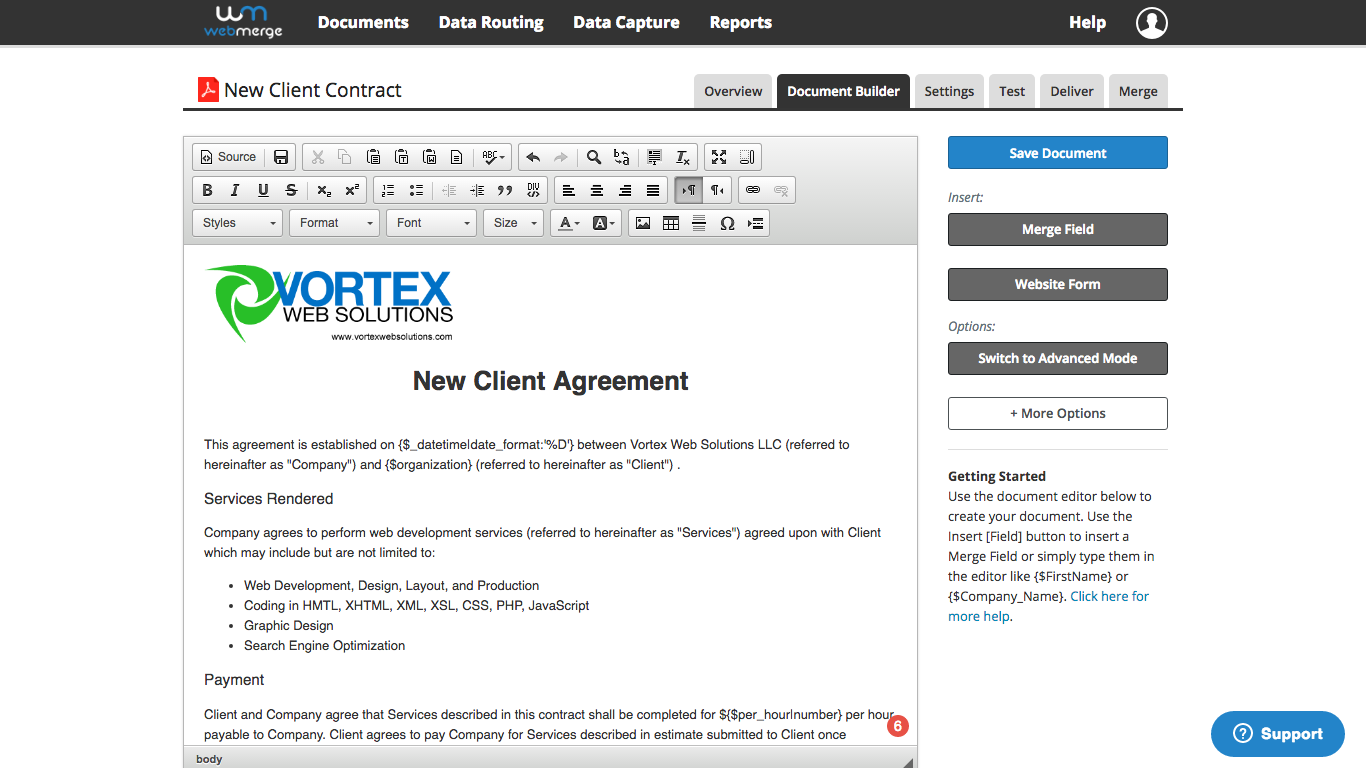
To indicate a field that needs to exist filled in with new info, use {$fieldName}. For example, {$email} or {$business_name}. Unproblematic, right?
So, choose where you want completed documents to go. Possibly you desire them saved to a Dropbox or Google Bulldoze folder, emailed to you lot, or sent to a tool where you tin collect signatures.
Finally, select your data source. You could manually import data from a spreadsheet—simply that sort of defeats the purpose. Instead, use Zapier to set up an automated workflow. Your document templates volition be automatically populated with data from some other app—similar a survey or eCommerce tool.
For example, if you apply PayPal to run your online shop, you could use Zapier to create a custom receipt for each customer. Or, if yous however want to use spreadsheets, just connect Google Sheets to Formstack Documents and new rows volition exist turned into formatted documents in seconds.
HelloSign
Many customized certificate templates require approval from a client, employee, manager or partner. With HelloSign, yous tin painlessly collect signatures from anyone—just upload a template, indicate where recipients need to sign and add together information, then send it off.
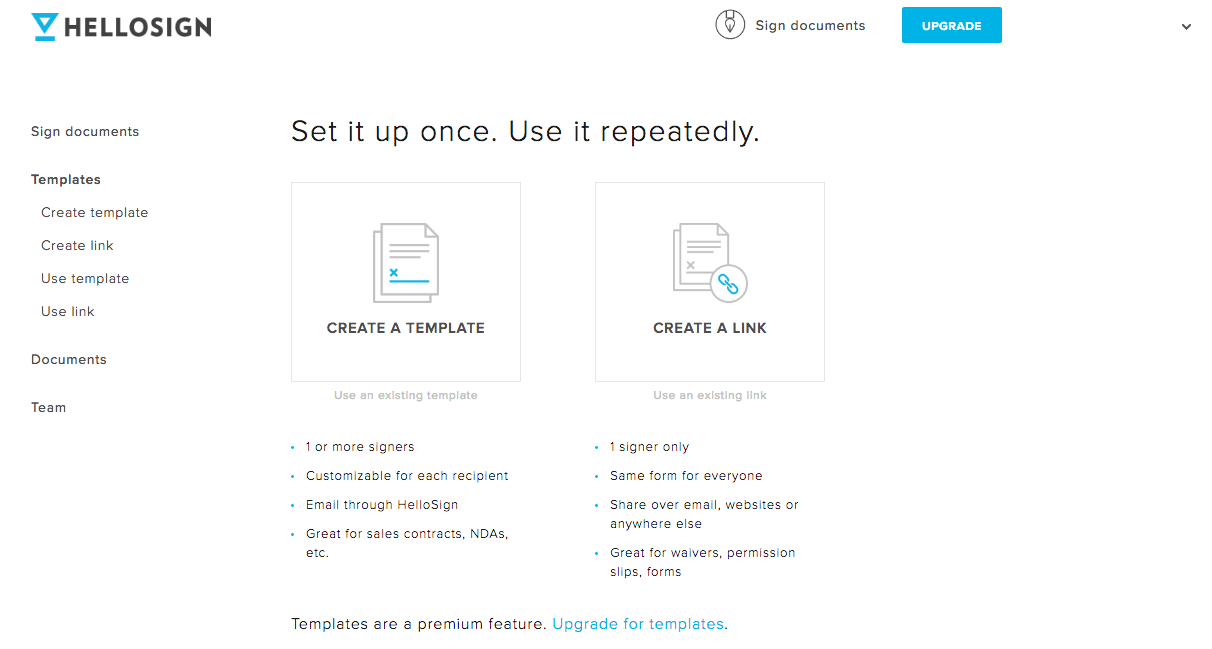
Want to make this procedure even easier? Utilize Zapier to connect your CRM, e-mail platform, survey tool, and any other apps, and build workflows that handle your templates automatically.
For instance, I use Proposify to ship proposals to potential clients. When a customer accepts my Proposify proposal, Zapier tells HelloSign to ship my standard freelance writing contract to their email accost for signing.
How to create presentation templates
Nearly of the same document template tricks employ to presentations: create a base presentation with your general layout, utilise your mode to the slides, then duplicate the presentation and fill up in the blanks each time y'all demand to nowadays something.
Or, in that location's some other way. If you lot often reuse the exact same slides in dissimilar presentations—perhaps a slide with your business programme, company argument, goals, or some other common elements—you can re-create individual slides from one presentation into another without sacrificing your presentation's design.
Here's a quick tutorial on swapping content in Google Slides (and don't worry, this same fob works in Apple Keynote or Microsoft PowerPoint's desktop versions, too).
Google Slides
Google Slides is a good go-to for presentations, considering it's cloud-based—which means your templates follow you lot anywhere.
And but like Google Docs, information technology's pretty simple to start building. Just create your core slides in a presentation, with their own unique style and template that fit the content. Then, when making a new presentation, open that core template presentation, select the slides you want to use in the slide bill of fare on the left, and copy them.
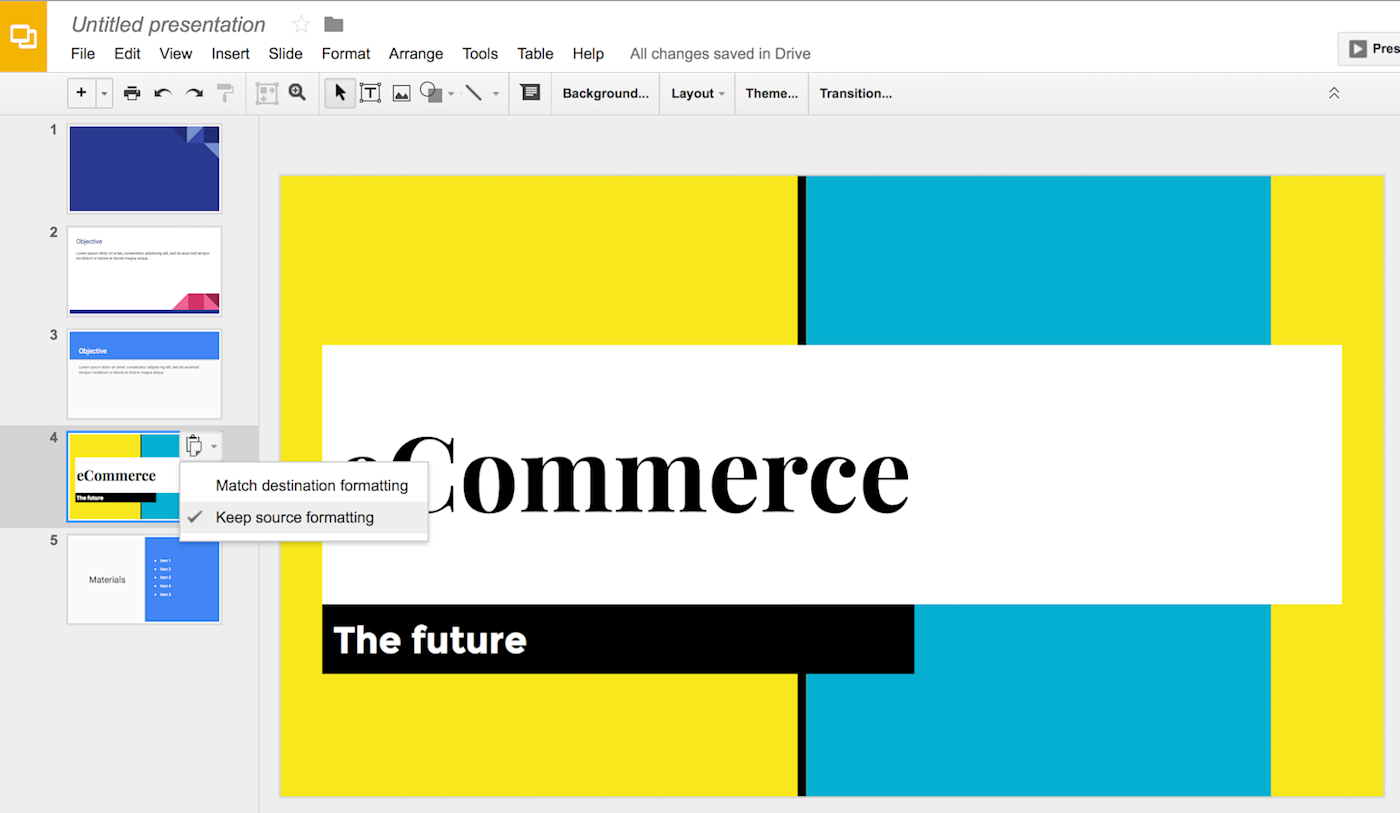
Now, just click in the slide picker on the left, and paste those copied slides. They'll retain the original formatting past default, simply if you want the slides to match your new presentation style, just click the paste icon and select Lucifer Destination Formatting. Follow the aforementioned process for Keynote or PowerPoint.
Alternate presentation apps
Another option is to not worry so much about your presentation's formatting, and just focus on the text, images, and videos in the presentation. At that place are a number of apps that can turn plain text and images into a presentation in near no time, including:
-
Deckset and Swipe plough Markdown formatted text documents into presentations, with pre-made templates
-
Evernote's Presentation Mode reformats your notes and web clippings into basic presentations on the fly
-
Slidebean chooses a theme for your presentation automatically based on your pictures and videos
-
Prezi turns your content into an animated presentation—information technology'southward center-communicable, though perhaps not time-saving
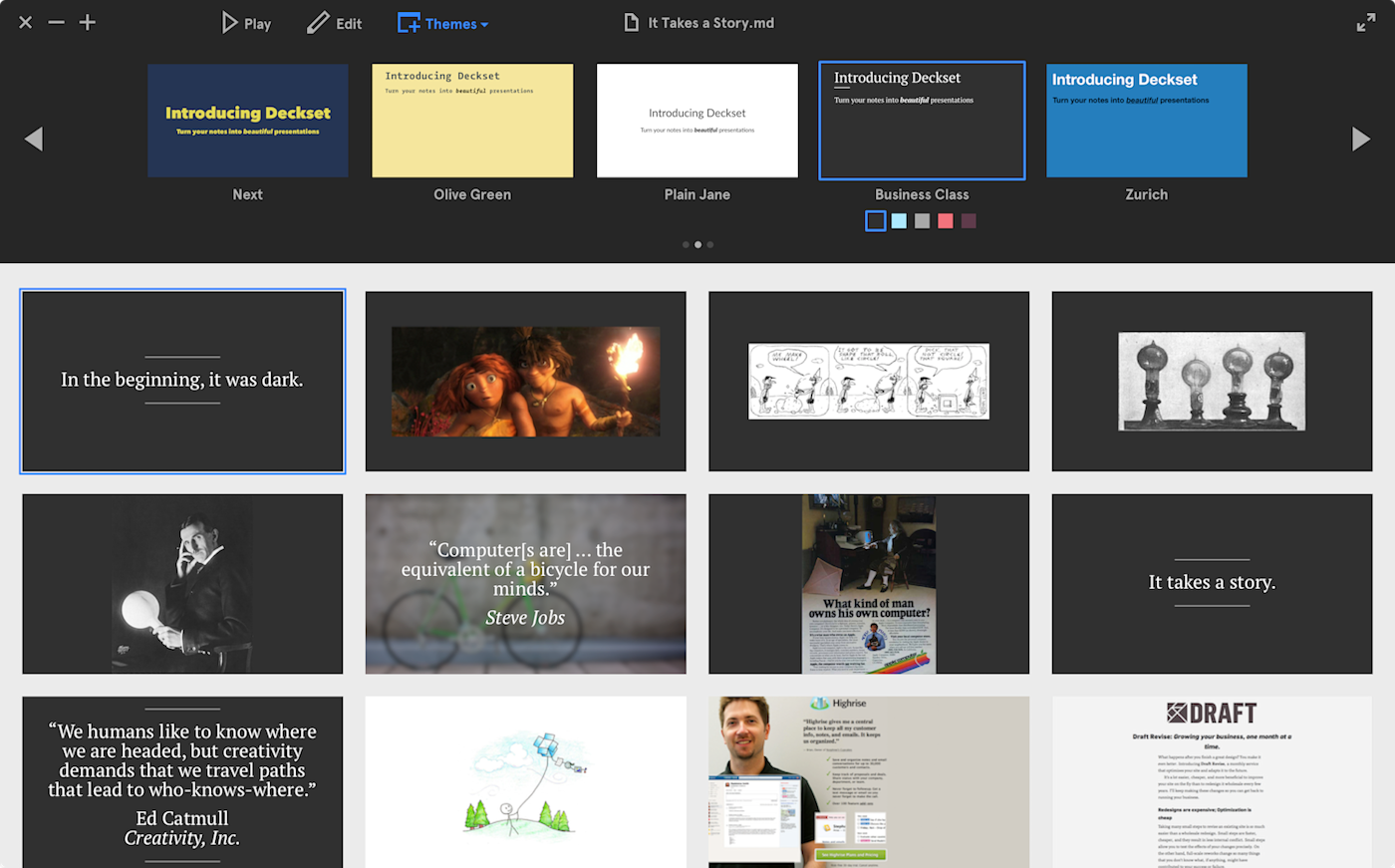
With most of these apps, use the aforementioned tricks yous'd use for creating document templates. Write your common points or presentation structure, then copy that document each time you lot need to brand a presentation. All yous'll need to do is open that file in your text-powered presentation app—or copy the text into the tool—and select a pre-made template design.
You lot won't get as customized of a presentation, but you'll save a ton of time.
How to create spreadsheet templates
Spreadsheets are similar LEGO bricks: You start with a agglomeration of seemingly random pieces, and plough them into complex structures. But unlike a tower of blocks, spreadsheets don't plummet if you lot bandy out or remove an individual component—so you tin reuse and edit them endlessly.
That's why they brand great template tools. Even improve, creating a spreadsheet template lets y'all apply the same provisional formatting to multiple data sets.
The tips hither work in most spreadsheet tools—so check out our roundup of the Best Spreadsheet Apps for more options, along with some spreadsheet history and extra tutorials.
Excel
If y'all're crunching large amounts of data, you lot're probably doing it in Excel—it'due south one of the most powerful and popular spreadsheet tools for adept reason. Luckily, Excel supports templates quite well, and then creating new versions of large files won't be a hurting.
To make a template, open the workbook you want to convert into a template, click Relieve As and give it a name. Then click the Salvage as Type box, but as in Word. You can relieve the file as an Excel Template, but if it'south got macros (automatic action in the spreadsheet), choose Excel Macro-Enabled Template.
Alternatively, you can modify one of the templates already installed in Excel. To check out your options, select File > New > Spreadsheet Solutions.
You lot can as well take advantage of the existing templates on Office.com. Once you've plant i, click on information technology to edit in Excel Online or download information technology to Excel.
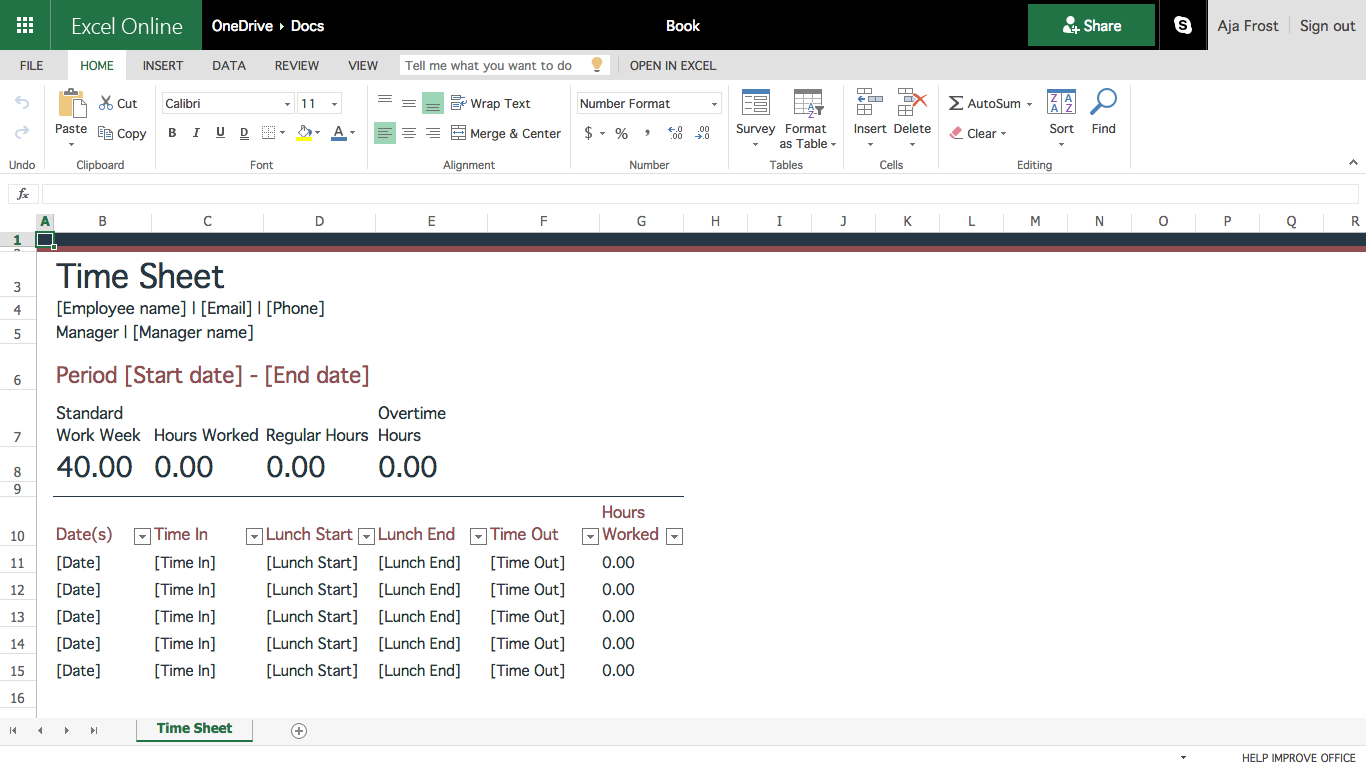
If none of those fit the bill, the Excel customs has developed templates for almost every purpose imaginable. Do a quick search for Excel template [use case] and take a look at the results.
Smartsheet
Smartsheet is a spreadsheet tool that's built around templates. You tin can make your own using an existing sheet every bit your baseline: But right-click its name and cull Save as Template. The sheet's column names, column types, conditional formatting rules, and dependency settings will be carried over to the template—forth with its data and formatting if you cull.
And so, if you lot've got an expense report that tends to look pretty similar from calendar month to month, yous can create a template with all your expenses already tallied up. Then, every four weeks or and then, y'all can brand any necessary adjustments, and have a report in no time.
Smartsheet also offers an impressive gallery of pre-made templates that cover everything from goal tracking to office relocation plans.
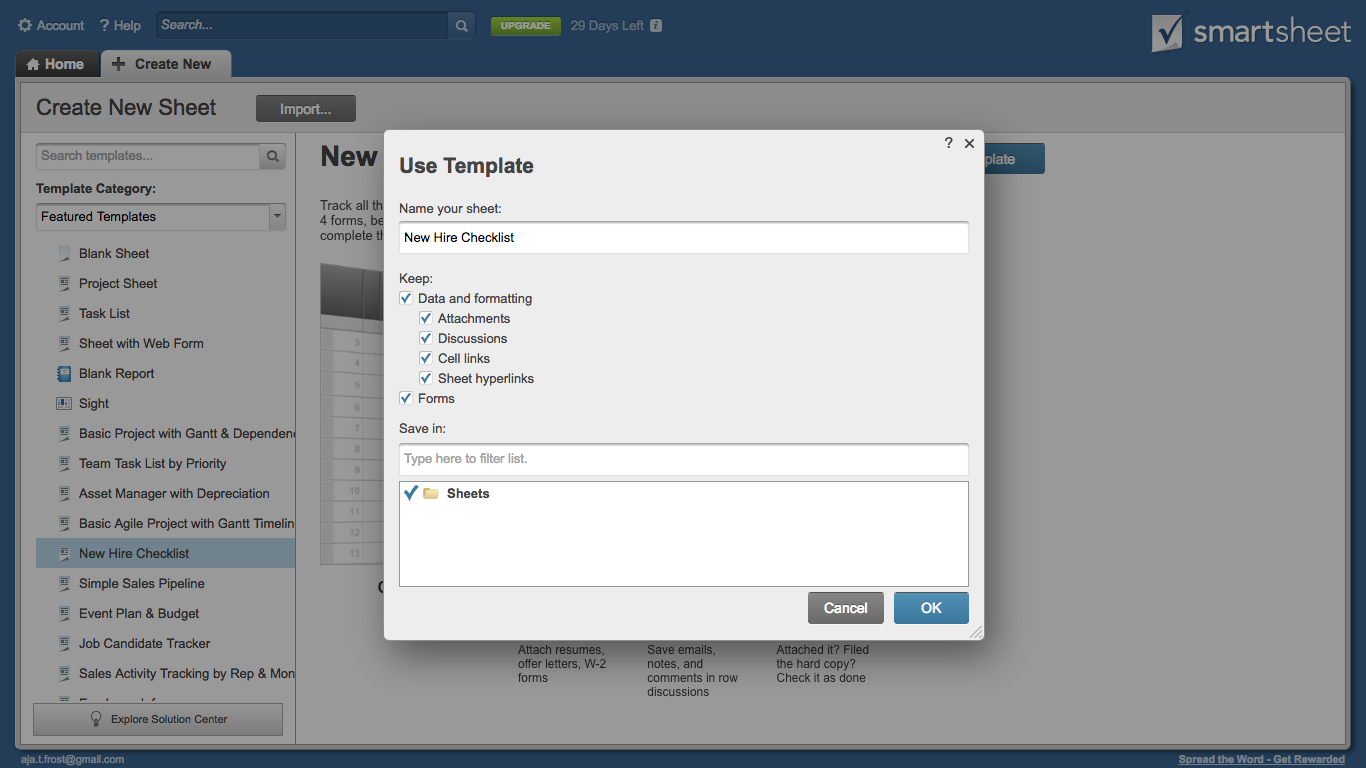
Once you've constitute the template you want, click on information technology and choose Utilise template. Arrive your own by adding data, changing the column names, applying your own formatting, and then on. When you lot're done, you can salvage the file equally a regular sheet by opening the Actions menu and selecting Save as New. Or, turn that customized version into your own new template by choosing Save every bit Template instead.
Smartsheet doesn't count templates against your sheets total, either, and then y'all can store an unlimited number in any business relationship.
How to create project management templates
Using templates to starting time new projects doesn't but cut downwardly on setting upwards workflows—it also helps you leverage the processes that have worked in the past.
There are three strategies that work in most projection management tools: Create a template projection using built-in tools, copy an existing projection to use equally your design, or import a spreadsheet and turn that into a project. Here are examples of these strategies in some popular project management apps.
Trello
Trello is designed to break your projects down into groups chosen boards, which means it'south the perfect tool for creating templates—but you'll need to re-create those boards to reuse them.
To make a template project, merely create a new board, add the appropriate lists and cards, then flesh them out with the relevant attachments, project members, and descriptions (if applicative). For example, if your coworker always handles visuals for your blog posts, you could assign the Create graphics bill of fare to them in advance and add template design files—at present, every time you use this template for a new project, they'll already be assigned to that chore.
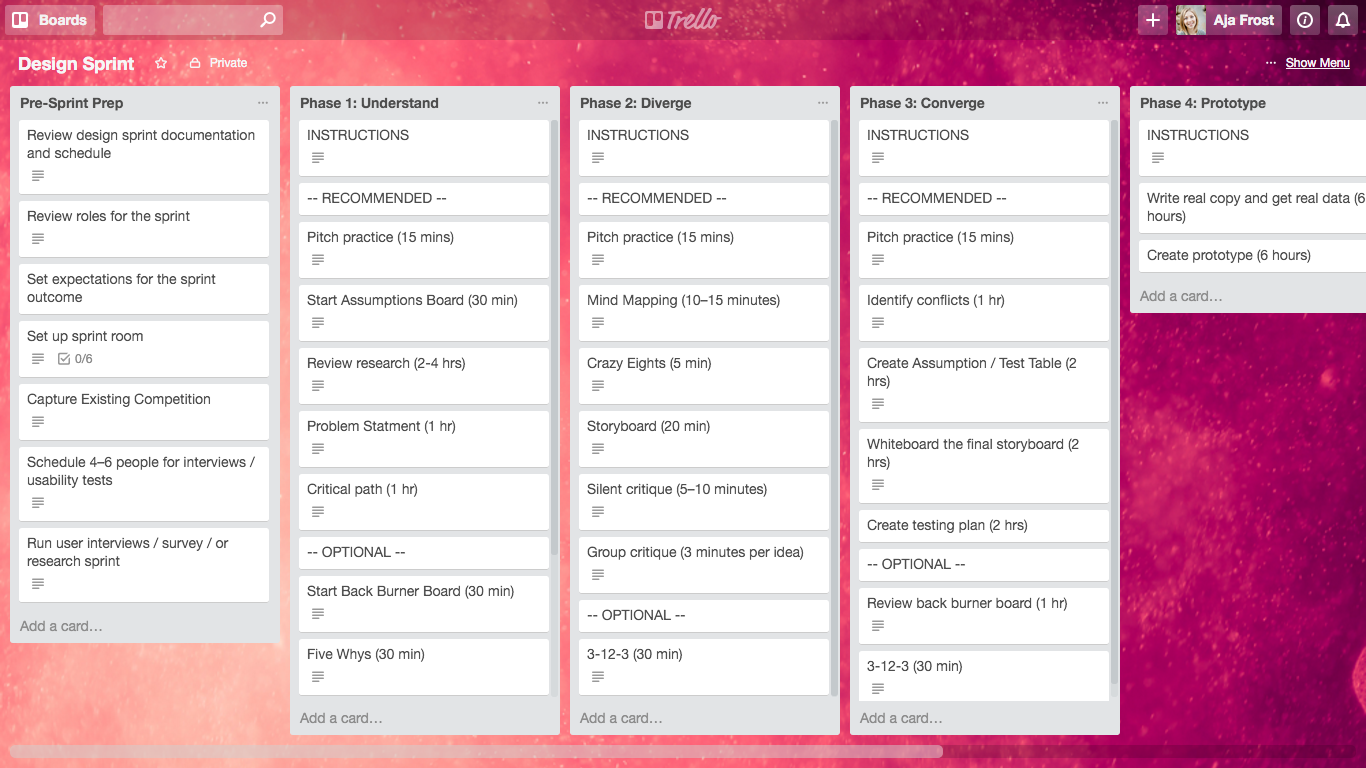
When yous want to use this template, open the sidebar carte, choose More then select Copy board.
If you lot don't want to go to the trouble of creating a brand-new lath for your template, simply copy an existing 1. You tin can cull whether or not to carry over the cards—a handy manner to reuse an erstwhile projection'south list construction without duplicating completed tasks.
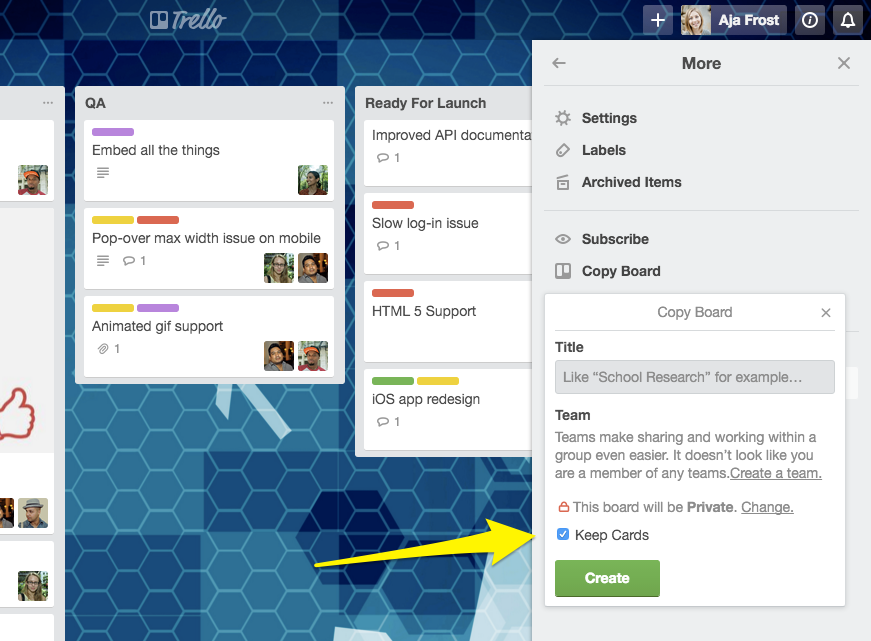
Y'all could also create templates for specific projection stages rather than the unabridged project. Say yous offer a range of different digital marketing services. Create a list for every service (like SEO Inspect [Template]); then when yous go a new client, you can copy the lists for the services they've asked for into a fresh Trello board.
Trello even lets yous re-create private cards, and so you can create a job template with a checklist, attachments, and assignees. So, to add new tasks with that aforementioned ready of checklists and attachments, but re-create the carte du jour and fill in this task's unique details.
For projection template ideas, cheque out Trello'southward Inspiration collection. Yous'll notice templates for business, productivity, lifestyle, and didactics designed past people like Buffer's Kevan Lee and Brit & Co'southward CEO Brit Morin.
Asana
There are two ways to make templates in Asana: starting time a new project and save it as a template, or indistinguishable an existing project.
If you go with the second option, you'll want to change the sections and tasks to make them more generic.
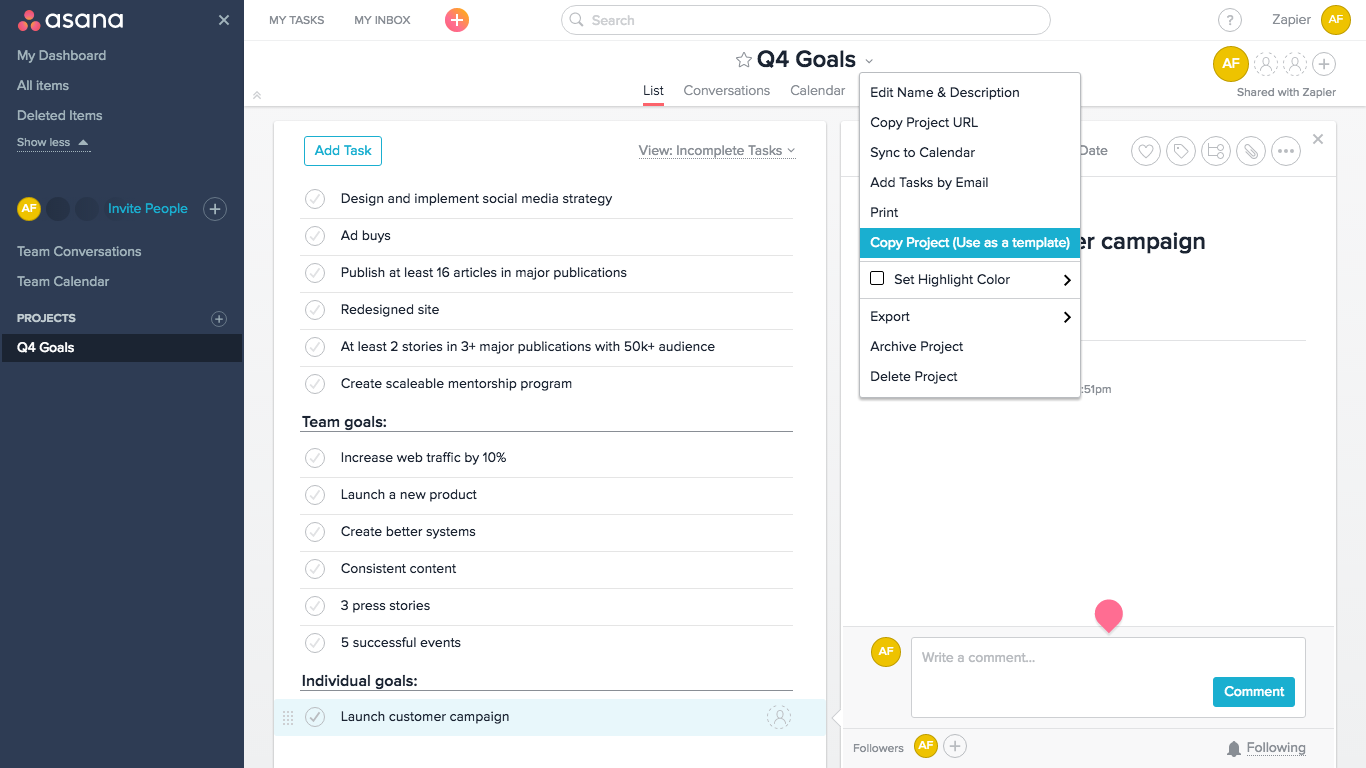
For templates, but open an existing project, click the dropdown card at the top-right of the master window, and select Use as a Template (Copy Project). Asana recommends creating projection templates for processes with five or more steps—either by reusing an sometime projection every bit a template, or with a new project designed just to be a template.
Still, for processes with five or fewer steps, you lot should create task templates. As with project templates, just add a new template task, or indistinguishable an existing task and modify it.
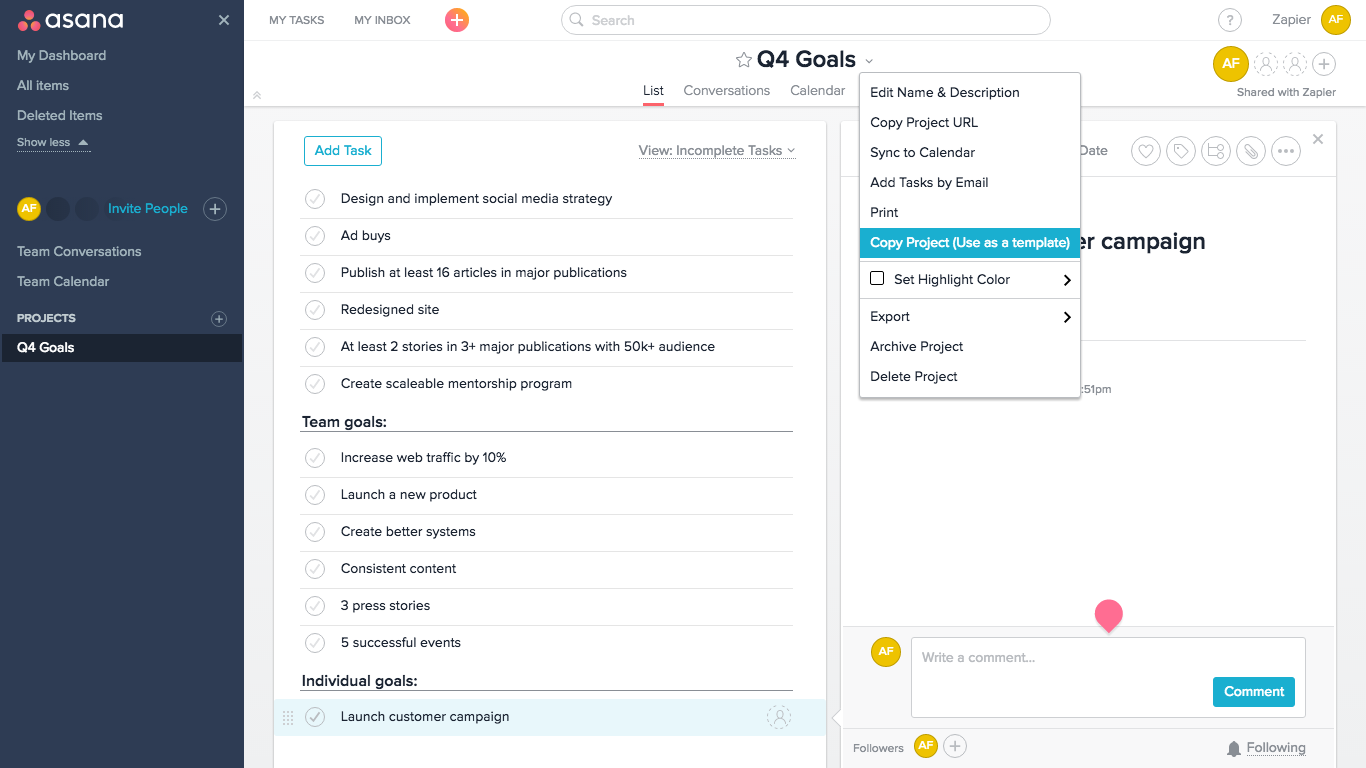
Make your templates easy-to-admission by creating a template tag. You tin add it to the appropriate tasks, then favorite your template tag. Now, all of the tasks tagged template will show up in your left sidebar where you lot can easily reproduce them when needed.
Redbooth
Redbooth comes with more than than xl tailor-fabricated workspaces, for everything from planning an off-site executive meeting to designing a new brand, logo, or site. Choose a template, and information technology'll be added to your Redbooth account where you can customize it and start working.
What if you want to make your ain template? Redbooth doesn't let yous re-create workspaces, so you tin't create a generic projection and clone it (like you would in Trello or Asana).
But Redbooth will convert spreadsheets into workspaces. You can make a template in Google Sheets, Smartsheet, or Excel, then import it into Redbooth every time y'all want to use it.
Hither'due south my "New Hire Onboarding" template in Google Sheets:
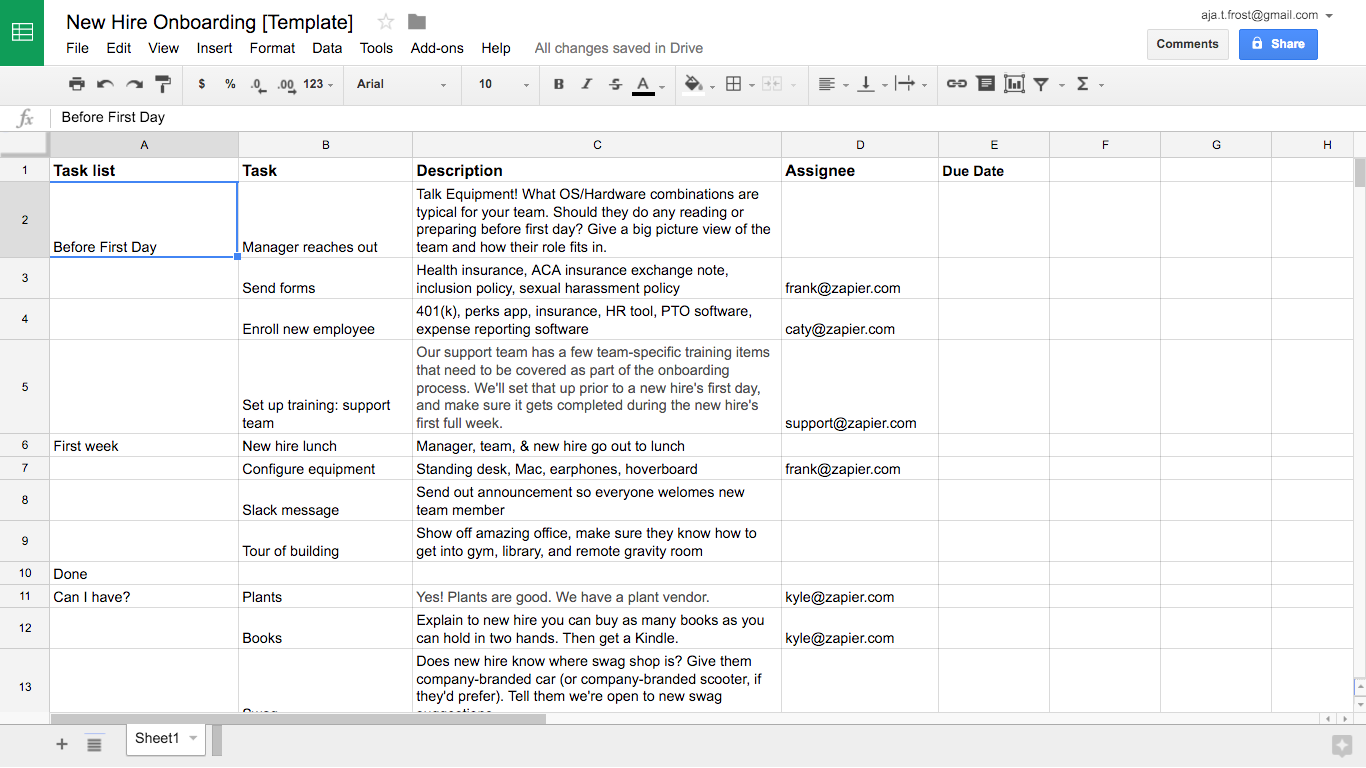
And here's what the template looks like once I imported it into Redbooth:
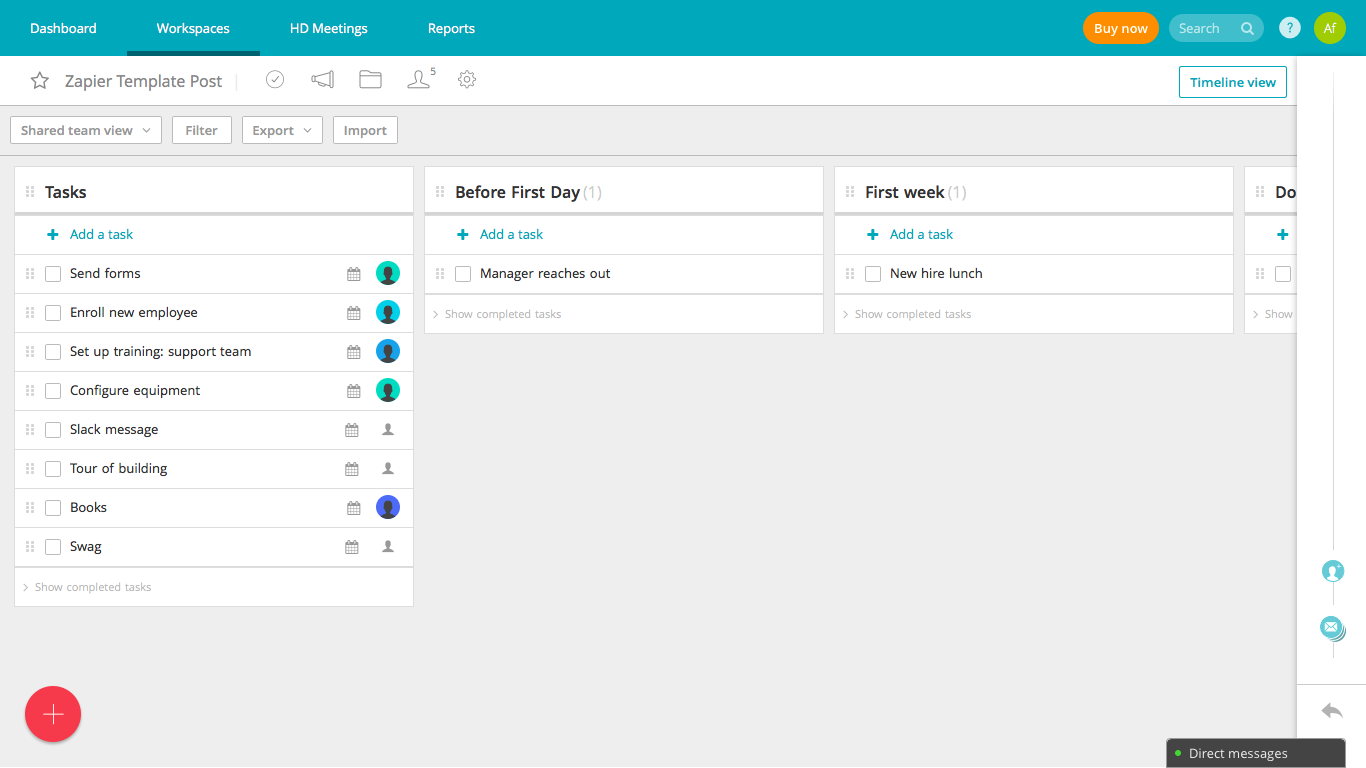
You can too import projects from Trello, Microsoft Role Project, Wrike, Basecamp, and Asana, so if y'all take existing templates in any of those platforms, you can use those as well.
While you can't duplicate workspaces, Redbooth does let you lot indistinguishable tasks. Endeavor creating a workspace specifically for your template tasks so you can hands observe them; when you're set to utilise one, open it and click Re-create & assign task from the right dropdown menu. Once it's been created, move it to the relevant workspace.
Basecamp
When information technology comes to standardized workflows, Basecamp has your back: rather than copying existing projects, you tin can create endlessly reusable templates. These templates alive in a separate section from normal projects, which makes them a cinch to find (and guarantees you won't accidentally delete or change your master re-create!).
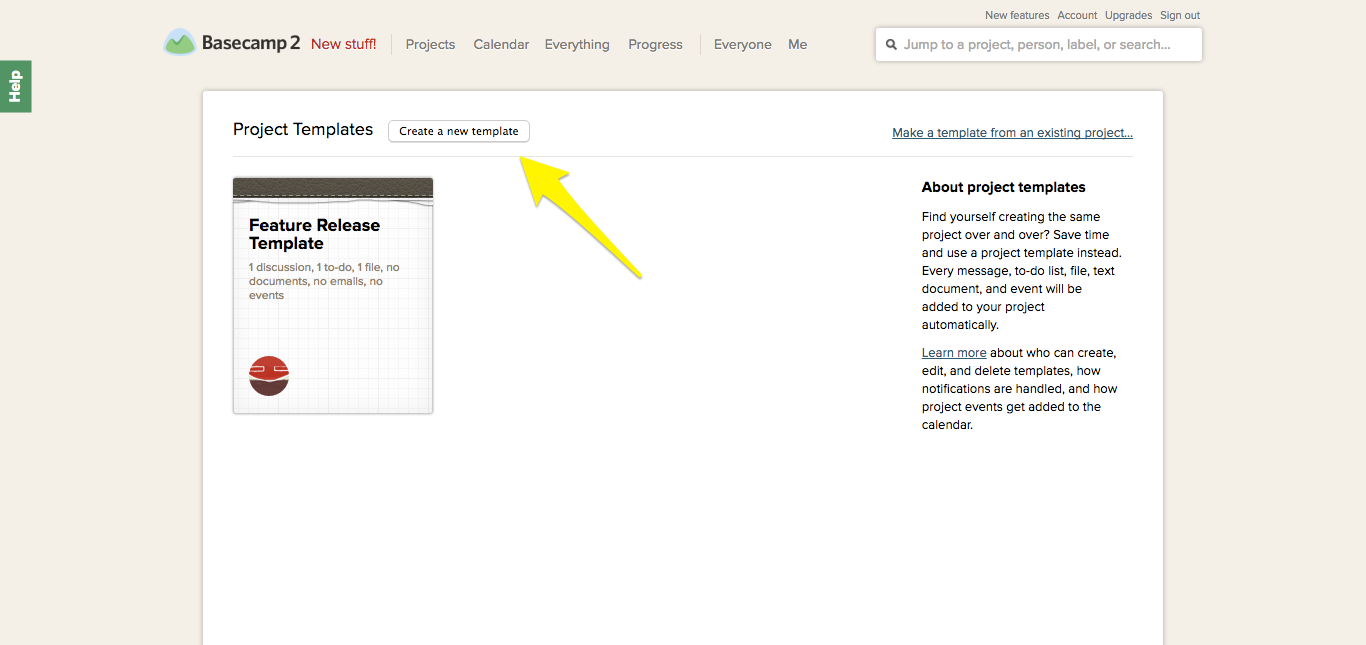
To make one, get to your main dashboard, click Templates and select Create a new template. Adjacent, add together discussions, to-do lists, and files. You can also add team members, who will automatically be assigned to every projection you create from this template.
Streamline matters even more than past adding deadlines. Basecamp volition start the timeline once you've launched a project—and then if you create a job for "Day vii," Basecamp volition schedule that job for one week after the projection goes live.
Even better? You can fix a Zap and so projects are automatically created from templates when a specific trigger happens: like, say, a new event is added to your calendar, or a new item is added to your to-practice listing.
Active Collab
Active Collab is another project tool designed for templates. Just open your projects listing, and choose Templates, then click + New Template.
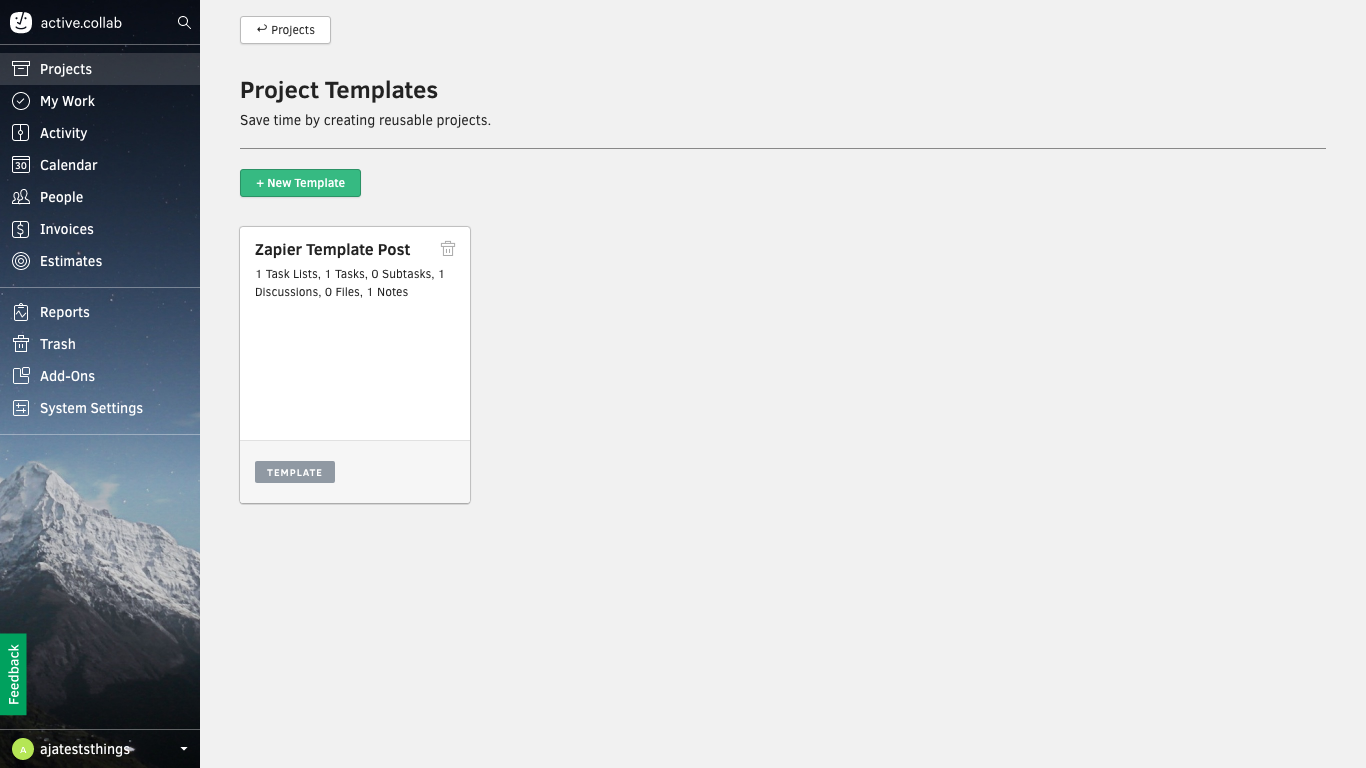
The app lets yous preset tons of details, so you can immediately jump into the real work next time yous start a project. Choose which team members you want to add together to every version of this template, create tasks and task lists (with relative due dates, then they'll be based on the solar day the project goes live), set discussion topics, upload images and files, and attach project notes.
How to create survey templates
Survey design is a alloy of fine art and science. One time you've found a winning combination of length, blueprint, wording, and formatting, use a template to repeat your success once again and again (not to mention, shave precious fourth dimension from the survey creation procedure).
SurveyMonkey
Figuring out which questions to ask your survey respondents and how to frame those questions is really difficult—and if you don't pull information technology off, your survey results volition be misleading and potentially useless.
That'southward why SurveyMonkey offers about 200 set up-to-utilise survey templates. They comprehend all sorts of apply cases, from client satisfaction and employee surveys to market research and website benchmarks, and are designed to prevent bias in responses.
To create a survey from a template, log in and click + Create Survey in the upper-right corner. Choose Start from an Practiced Template, then observe the appropriate template. Select Employ this Template.
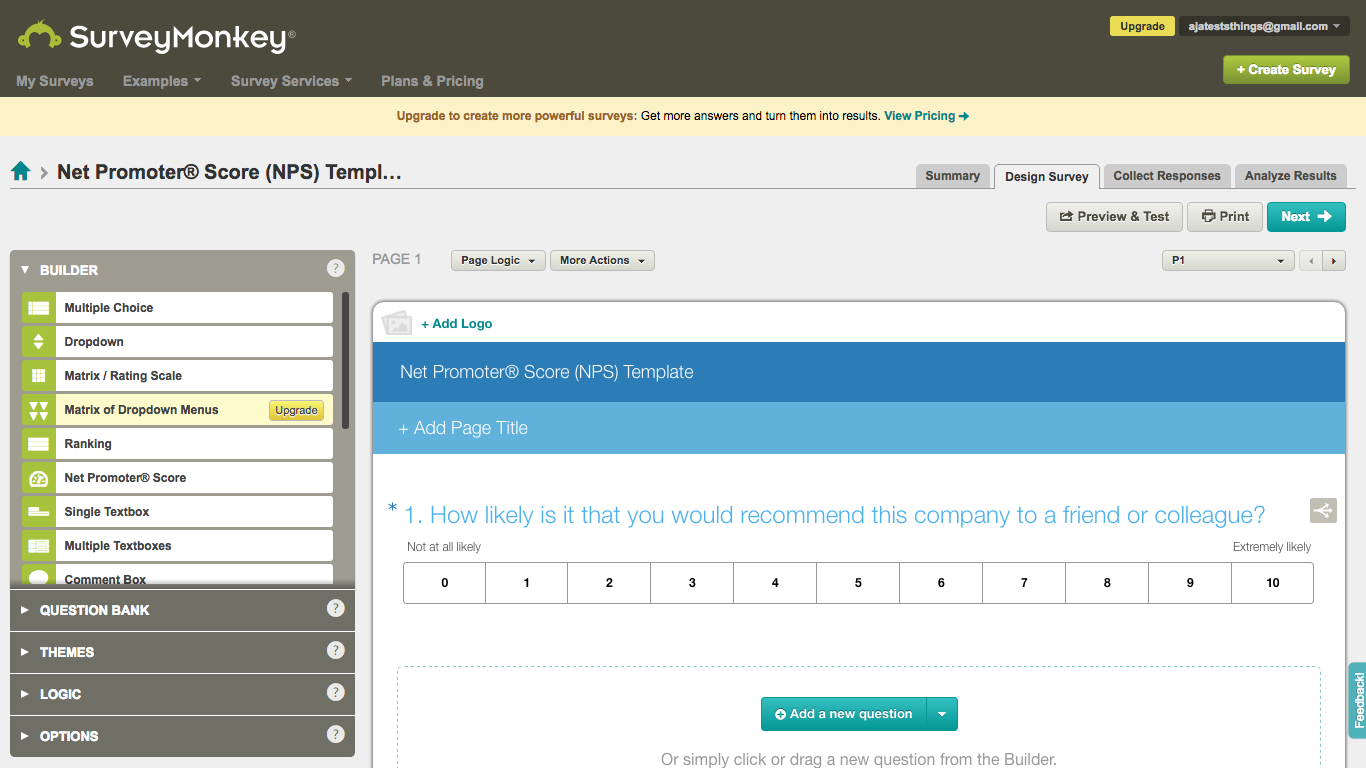
At this bespeak, you can edit questions, add or delete them, and change the design and display of the survey.
Once you've crafted a survey you're happy with, yous'll probably want to employ it again. There are 2 ways to reuse surveys in SurveyMonkey.
First, y'all tin make a clone. Click + Create Survey in the upper correct corner, cull Edit a Re-create of an Existing Survey, and cull your de facto template. Enter a title for the re-create of the existing survey. Then click Permit's go! to edit the theme, questions, and settings.
Alternatively, if you accept a Platinum account and you lot're the Primary Admin or Admin, you tin add a template to the grouping library. Click Library in the header of your business relationship, then + New Item. Choose an existing survey to brand into a template. Every aspect of the survey pattern will be included in the template, including all questions, the theme, logic, options, and images—and then remember to change annihilation that yous don't want to include in the new survey.
Looking for a different survey app? Check out our roundup of the all-time survey builder tools, many of which let you re-create surveys to use as templates similar SurveyMonkey.
Wufoo
Course builder Wufoo splits its templates into ii broad categories: content and design. Brainstorm by choosing the form, template, survey, registration, lead generation, online order, or tracking template y'all'd like to use—then pick out a colour scheme using Wufoo's CSS theme gallery. The outcome? A survey that fulfills both your aesthetic and copy goals.
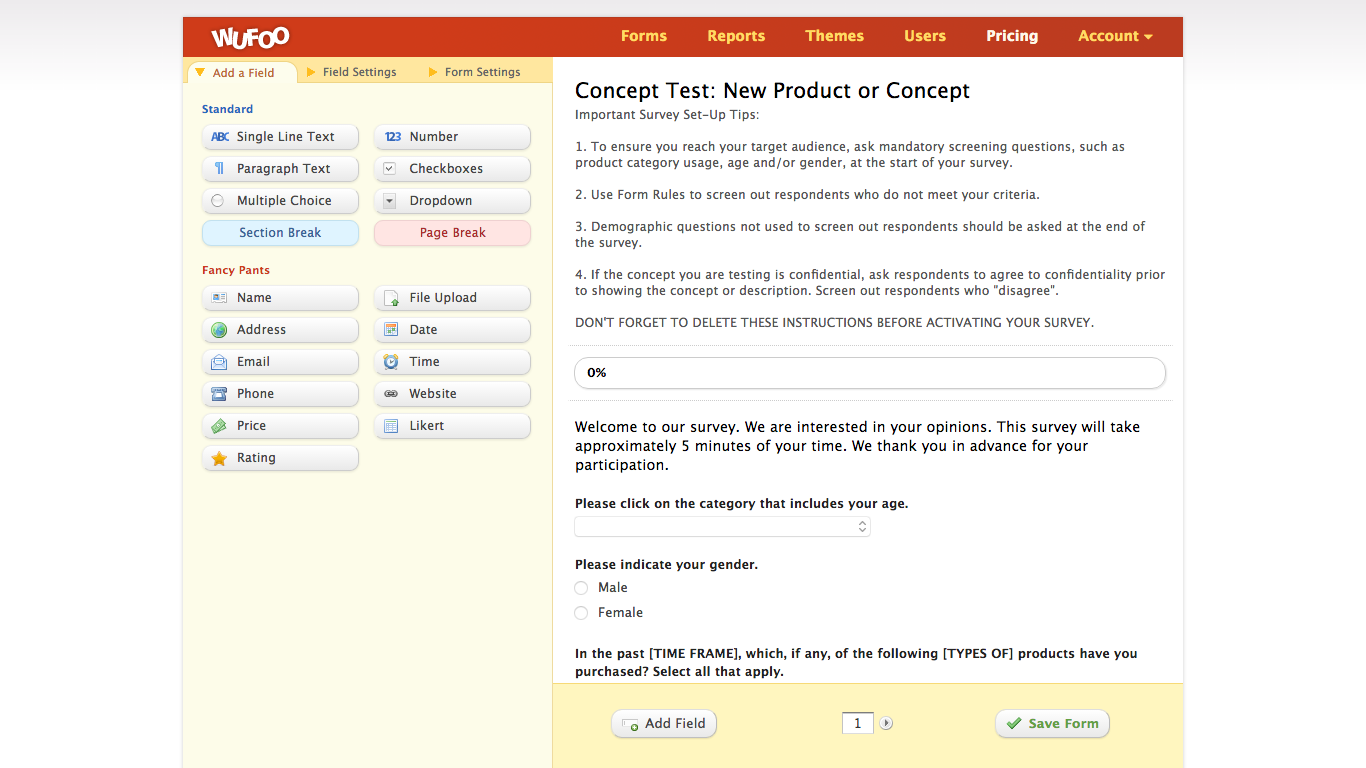
When y'all want to re-send a survey or send a modified version to a fresh group, get to the Forms tab, find the survey you desire to reuse, and click Duplicate. Wufoo gives the child form the aforementioned name every bit its parent, then brand certain to immediately rename information technology so you don't get confused about which is which.
In improver to template forms, Wufoo also supports templating text in forms. In other words, it'll dynamically supercede a shortcut phrase with information the user has entered in your survey.
To make a shortcut, you put the corresponding field number in brackets: {entry:FieldX}.
For instance, if the offset field in your survey is Offset proper noun, and the 2d is Concluding name, you could create a confirmation at the end of your course that reads:
Thanks for your fourth dimension, {entry:Field1} {entry:Field2}.
If Jon Snowfall filled out the survey, his confirmation would read:
Cheers for your time, Jon Snowfall.
Nifty, right? Hither are Wufoo'southward step-by-step instructions.
How to create email templates
Templates take changed the mode I ship email. I used to dread typing out routine messages and would often put them off; at present, they're the first ones I answer to, since the job has become and so quick.
Hither's how.
Gmail
Gmail users, did you know you could set up e-mail templates? To activate Gmail templates, click the Gear icon, select Settings, and then choose the Advanced tab.
Halfway downwardly the listing, you lot'll find Templates. Click Enable, then save the changes.
At present yous can set up your first template. Create a fresh email, blazon out your template, and so click the iii dots in the lower correct-hand corner of your Compose window.
Choose Templates > Relieve typhoon as template, then requite your template a proper name.
Voila—y'all've made your first ready-to-become message. Anytime y'all want to apply information technology, open a new email, click the iii dots again to access Templates and find the name of the template yous want to employ.
Outlook
Setting up templates in Outlook takes just seconds. Create a new e-mail (or press Ctrl + Shift + M), type in your email template text, and so click the File tab. Choose Salve as > Save equally file type, and then select the Relieve as Outlook template option and add a proper noun to your template.
Using templates is a little less direct: click New Items > More Items > Choose Class. And then, in the Look In: box, cull User Templates in File System. Highlight the template you want and open it, and then customize and send the template email.
If there are a few templates you lot use all the time, you could instead add them to your Quick Steps ribbon. Open the ribbon, click Create new, then type a name for the template (for instance, "status update template," or "meeting confirmation template.") Then, choose New Message, click Show options and insert the subject line and text of your template. Next, select End. Now the template is available to use in a single click from the ribbon in the future.
Mailchimp
Crafting a beautiful e-mail for your customers and contacts takes a lot of fourth dimension and energy, then having go-to templates is a huge productivity boost. Email listing tool Mailchimp includes the tools needed to brand beautiful email templates that will be automatically customized for your readers.
You can access templates at any fourth dimension by clicking Templates in the upper navigation bar. To make a new one, select Create Template.
Mailchimp's templates come up in two flavors: Basic (blank layouts) and Themes (pre-designed and pre-formatted templates).
If you're creating an electronic mail campaign around information from a different site, you tin use an AutoConnect template (found under Themes.) Once yous connect an AutoConnect template to another application (options include iTunes, Twitter, Facebook, SurveyMonkey, Eventbrite, eBay, and Etsy), Mailchimp will pull in the relevant info and images.
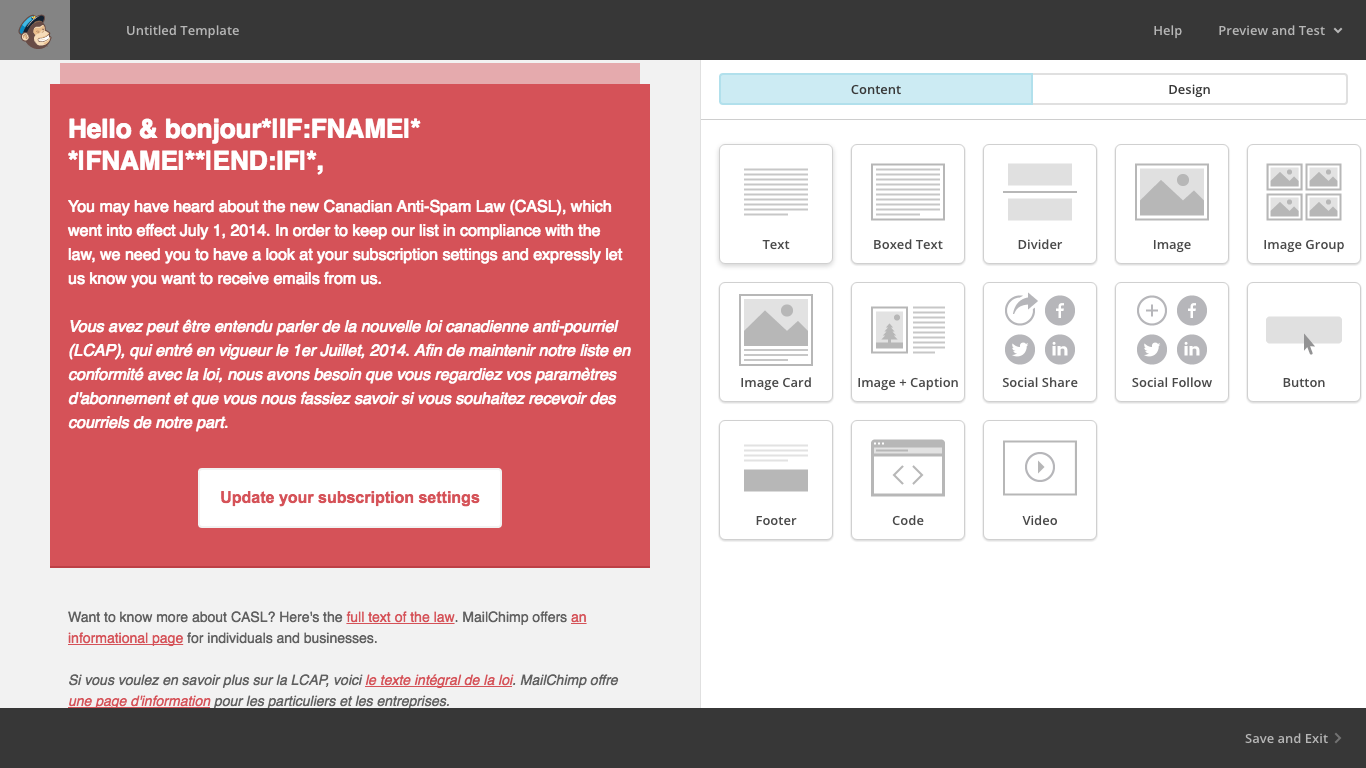
For example, allow'south say you're promoting an Etsy product. Ready an AutoConnect template with Etsy, and Mailchimp volition pull in your header epitome, profile info, and link to your shop.
If you lot regularly publish blog posts, you'll find the RSS-to-e-mail templates actually handy. Pick a style, tell Mailchimp which RSS feed you lot'd like to use, and decide on a cadence (daily, weekly, or monthly). Now your subscribers will consistently become fresh content, and you don't have to lift a finger.
When you lot're gear up to send out a campaign, click the Campaigns tab and choose Create Campaign. Once you've selected the details of your campaign and entered the Design phase, y'all'll be able to choose a template. Copy, delete, and rearrange your text and picture show blocks to brand a unique version of your template, or go out it as is. Then, send it off.
Mailchimp also lets you duplicate private campaigns. Go dorsum to your Campaigns tab, find the one you want a copy of, click the dropdown arrow, and choose Replicate.
Desire to employ email templates in other newsletter tools? Take a look at our guide to the best email newsletter apps—most of them support templates equally well.
Use text expanders to build templates in whatever app
Information technology'south awesome when y'all're using an app that supports templates (like all of the options in this roundup), but what about when yous're using an app that doesn't? Thanks to text expanders, you lot can insert templates in a matter of seconds—no copying and pasting required.
A text expansion app lets you set upwardly keyboard shortcuts for basically whatsoever content you'd like.
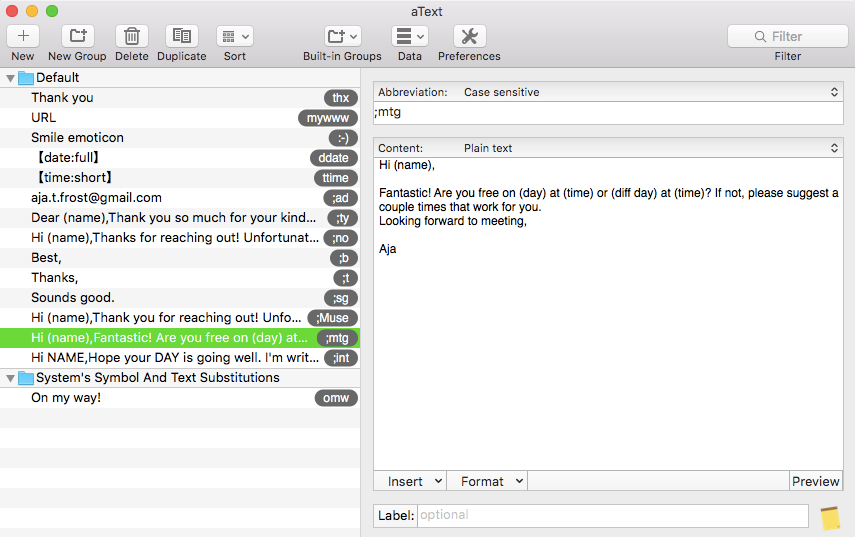
For instance, since I'grand always getting emails from PR reps asking me to plug their clients' products, I've set up a polite "no cheers" template using the shortcut no;.
Every time I type no;, that string is replaced by:
Hullo (name),
Cheers for reaching out! Unfortunately, I don't think I'm a practiced fit for this article. If you could remove me from your electronic mail list, I'd really capeesh it.
Best,
Aja
Not only are text expansion apps smashing for e-mail templates, they also piece of work well for social media posts, answers to frequent requests or questions, meeting agendas, standard proposals, and project outlines.
If yous desire to be still more efficient, take advantage of macros. Macros are essentially baked-in shortcuts, but they change depending on the context.
For instance, if y'all wanted your template to include the current month, day, and yr, y'all'd insert the "date" macro. Then, every time you used that specific template, the text expansion app would automatically pull in the correct date.
There are also macros for time, images, and clipboard (whatever you copied last will be pasted in).
That'south just a quick intro to text expanders. To larn everything yous need to go a text expander good, and to find other keen text expander tools, cheque out our text expander guide.
Create templates for whatever app with automation
Desire to use templates even easier in any app—even those that don't support templates? If your app is one of the 650+ tools supported past automation tool Zapier, you lot could take templated documents, invoices, projects, emails, and tasks created automatically whenever they're needed.
Say you lot want to create a template in a project management app like Insightly, or need template notes for your next outline in Evernote. Or mayhap you desire to ship a template email reply automatically without having to open up Gmail. Zapier can aid.
First, you'll need something to trigger the automation. Perhaps yous accept a course people fill out to order your product. That'd exist your trigger, one that could ship them an e-mail or start a projection. Or perhaps you want to transport template emails, and like calculation contact info to spreadsheets. A new row in the spreadsheet could be the trigger.
Another style to trigger the automation is a schedule. Say you need to start new projects every month, brand invoices each calendar week, and practise the aforementioned iii tasks each solar day. Zapier's Schedule tool can run on whatsoever schedule y'all desire, and trigger your automation to run every day, week, or calendar month.
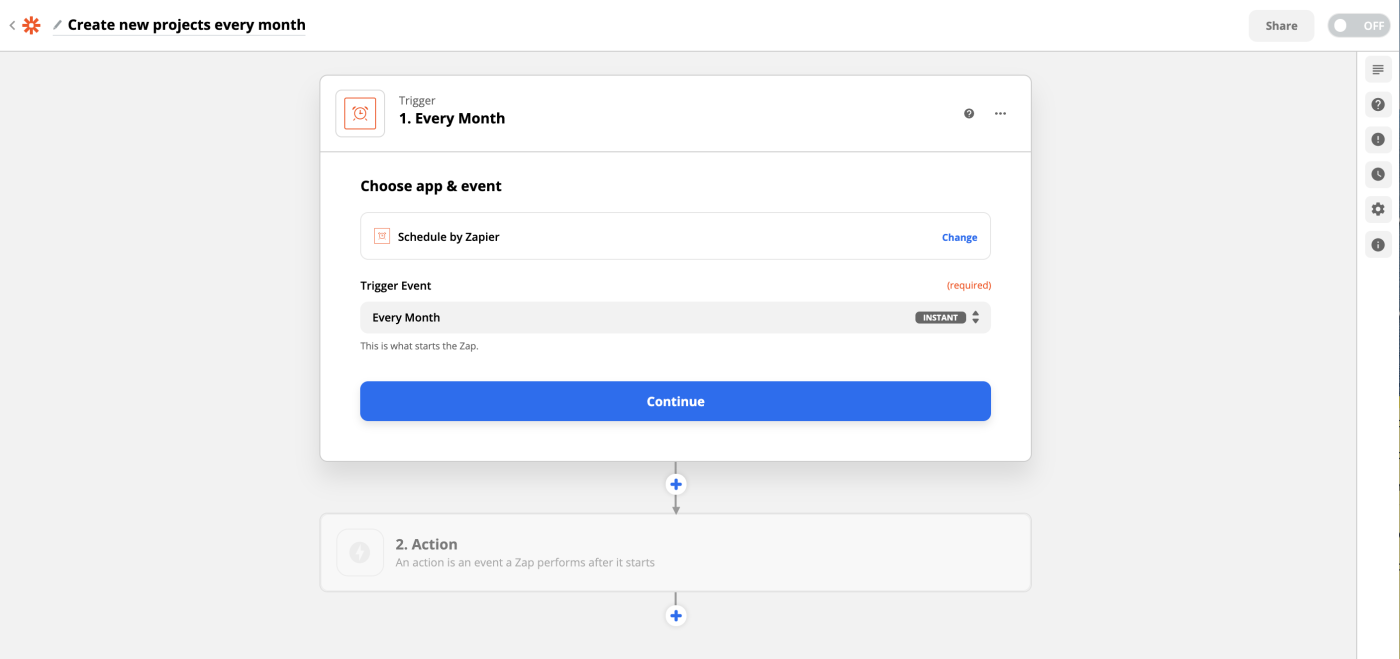
Once you've got a trigger, it's fourth dimension to make that template. With apps similar Basecamp, you could simply make a new project or document from a template. With everything else, blazon your template into the Zap template. You tin can add standard text, pull in names and other details from your trigger app, and tweak whatsoever of the settings in your integration. Then, test the integration and turn it on, and your template will be made every time it's needed.
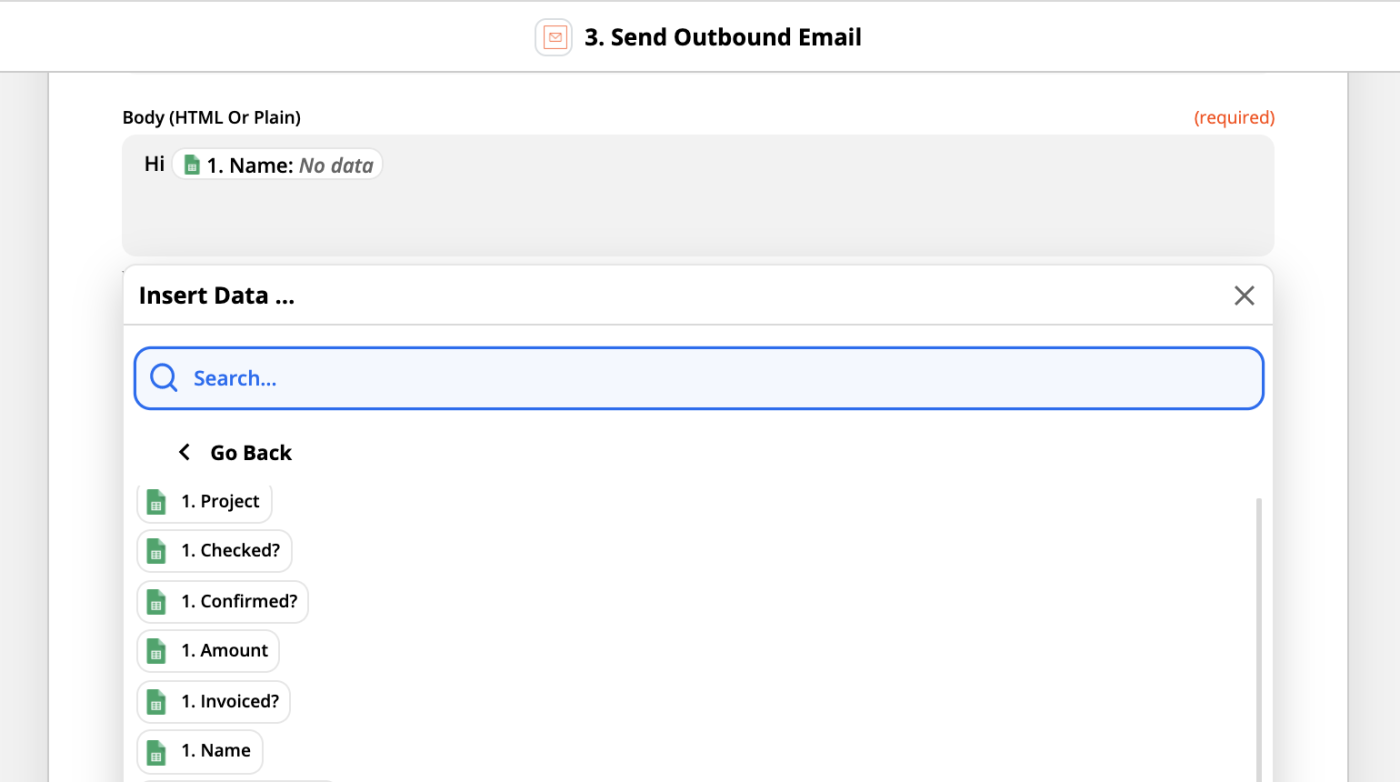
Just call up through the documents, tasks, and other things you accept to create with templates, and come across how many of them also could get made whenever a trigger issue or scheduled appointment occurs. Automate each of them with a Zap, and you lot'll salvage even more time with your templates.
Template everything
Once I discovered the amazing power of templates, I started templatizing everything. Then, of course, I concluded up with tons of templates I never used again.
To avert my mistake, I advise watching for patterns in your piece of work—once you find one, create a template for it. For example, if you realize y'all've sent iii coming together confirmation emails in an hour, make a meeting confirmation template. If you discover your schedule for the team retreat looks really similar to last quarter's schedule, set up a squad retreat template.
Past following this approach, yous'll end up with the perfect amount of templates.
This article was originally published in May 2016 and has since been updated with contributions from Elena Alston.
Get productivity tips delivered straight to your inbox
We'll email yous ane-3 times per week—and never share your information.
How To Create A Template The Uses Excel To Drop In Words Or Phrases To Email,
Source: https://zapier.com/blog/how-to-make-document-template/
Posted by: ruizwarsted.blogspot.com


0 Response to "How To Create A Template The Uses Excel To Drop In Words Or Phrases To Email"
Post a Comment